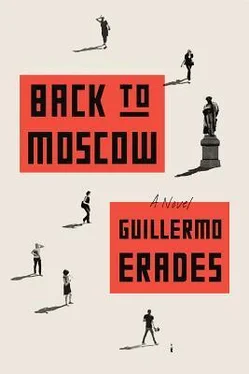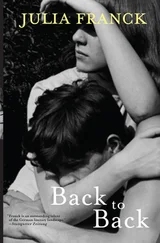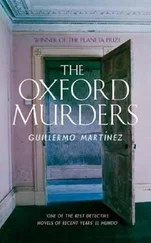The kitchen, a separate room with wood-clad walls and a small dining table, was functional, warm and cosy. On top of the table, next to the wall, I placed an old electric samovar. Lena insisted that the samovar — a silvery soviet model I’d bought at Izmailovsky — made better tea than any modern kettle. I liked its polished look, which made me think of a well-deserved trophy, and the way the lid rattled furiously when the water reached boiling point.
Both balconies, the kitchen one and the living-room one, faced not Tverskaya but the courtyard, which in warmer weather was half occupied by the tables and chairs of the summer terrace at Scandinavia. Because the other constructions around the courtyard were only two or three floors tall, the view from my sixth-floor balconies spanned all the way from Barrikadnaya to the buildings of the New Arbat, which may or may not have represented open books, but were, for some reason, loved by Muscovites and Christmas-lit all year round. If I stood on either of my balconies, I could gaze at a vast urban scape, an endless extension of rooftops, twisted antennae, old pipes and tangled cables and — if the day was clear — I could follow the sun setting on the horizon, behind the redbrick chimneys of the old soviet factories. Breathtaking.
I was now living in the heart of Moscow. Everything I needed was here: shops, restaurants, cafés, cinemas. Most places stayed open all night and it felt great to know that I could walk down to the street at midnight to buy milk or books or blinis. There were always plenty of people on the street, day and night. So much life that you never felt alone.
My building stood just a few steps away from Pushkinskaya. This was convenient because, as I had discovered during my first months in Moscow, Pushkin’s bronze monument at the centre of the square — the very statue Dostoyevsky had unveiled in 1880 — was Moscow’s favourite meeting point for couples, being both centrally located and, in a Russian way, romantichno. On warm days I would often wait for a dyev beneath the petrified but somehow disapproving regard of Aleksandr Sergeyevich. I would be the only man in the square not holding a bouquet of flowers, stingy foreigner, and I would be scanning the faces of arriving dyevs, trying to recognise the one I had met a few nights earlier, with whom I had probably exchanged a couple of kisses on the dance floor of a nightclub and a few messages in the days that followed.
If I didn’t remember what she looked like, which was often the case, I would wait patiently beneath Pushkin’s statue, looking distracted, leaving her the task of recognising me. Then, once we saw each other, we would say privet privet and I would take her across the square to Café Pyramida, which had an actual glass pyramid for a roof and lounge music and sushi and cocktails, and dyevs liked it, and we would chat for a while. If after an hour or so things were not happening, I would walk the dyev back to the metro, say poka poka, and that would be, most likely, the last time we saw each other. But if the dyev was friendly, and she didn’t order the most expensive thing on the menu, I would invite her for a cup of tea in my apartment, conveniently located across the street, with that enormous couch that I usually left open as a bed, and the spectacular views of the west of the city.
AS HARD AS I TRIED to understand her, I could never predict Lena’s outbursts. Nor could I grasp the reasons behind her frequent mood swings. One moment she was sweet and calm — the next she was hurt or hostile.
One hot summer evening we were in my apartment getting ready to go out for dinner. I had just showered and slipped into my jeans, and Lena was waiting for me by the door. I rushed around the flat, shirtless, looking for my mobile phone. I turned over the cushions and pillows on the couch, looked in the kitchen, checked the pockets of the trousers piled on the old leather armchair. The phone was nowhere to be found. The air in the apartment was warm and I was losing patience. ‘What the fuck,’ I said, in English.
‘What are you looking for?’ Lena asked.
‘My phone. Have you seen it?’
‘Did you check your pockets?’
‘Of course.’
‘Let me call you.’ Lena extracted her phone from her handbag and rang me. In a few seconds a faint ringtone emerged from a pair of jeans that lay draped over the wooden stool by the front door. Lena took my phone from the pocket and handed it to me.
Twenty minutes later we were sitting on cushiony white sofas on a new summer terrace on the Boulevard, waiting for our salads. I was having a beer, enjoying the warm evening. The sky was bright, pinkish, almost purple behind the buildings. But Lena was not in the mood. She was sipping her glass of chilled white wine, hardly speaking.
I knew she wanted me to ask what was wrong with her. But I didn’t want to ask. I didn’t want to reward her childish attitude. If she had a problem with something I’d done or said, let her bring it up. So I kept talking, pretending not to notice the way she was avoiding conversation.
I was saying something about how nice it was to live in the centre, how glad I was that I’d moved out of the university. Then I told her about my idea of writing a book about Moscow, a fictionalised account of my life in the city. She was looking down at her glass of wine, her blonde fringe, which she’d let grow a little, falling over her eyelashes and covering her eyes.
When I took a long sip from my beer, she finally jumped in.
‘Martin, tell me, why does it say Lena Propaganda in your phone?’
So this was it. The cause of her misery.
‘What do you mean?’ I said.
‘When I called you before, in your place. On the screen of your phone, it said Lena Propaganda.’
‘That’s where we met,’ I said. ‘Propaganda. Remember?’
‘You could just write Lena.’
I smiled. ‘It’s not such an original name in Moscow, you know.’
Her eyes remained fixed on her glass of white wine. I grabbed her hand across the table. ‘I just want to be sure it’s you I call.’
She removed her hand and stared at me — her big blue eyes now moist.
‘Who are the other Lenas?’
‘I don’t know. Old friends. I’m no longer in contact with them.’
‘Why do you keep their numbers then?’
‘Does it bother you?’
‘I don’t want to be Lena Propaganda.’
‘If it makes you happy, I can change it. Would you like me to add your surname? Or perhaps your patronymic?’ I took the phone out of my pocket, placed it on the table, between my beer and her wine. ‘What is it? Sergeyevna? Borisovna? What’s your father’s name?’
‘I don’t want you to write anything but my name.’
‘Is it my fault that so many girls in Moscow share the same few names? It’s all Katyas, Mashas, Lenas, Tanyas, Olyas, Natashas.’
She looked at me, now on the verge of tears. Then, in a shaky, soft voice she said, ‘I just want to be Lena.’
‘In my heart,’ I said, ‘you’re just Lena. Besides, it could be worse. You could be Lena Beefeater, or Lena Hungry Duck. Propaganda is classy, elegant, refined.’
‘It’s not funny, Martin. I know I’m not that important to you, but at least I would like to think that I’m more than just someone on a list.’
‘But, Lenushka, you are important to me. Otherwise we wouldn’t be here, right now. Listen, if I ever write my book about Moscow, you’ll be the only Lena in it. I promise.’
‘You have no heart,’ she said, a tear rolling down her cheek. ‘And my mistake is that I let you have me too easily.’
‘What do you mean?’
‘You never had to fight for me.’ She took a sip of wine, then placed the glass in front of her. ‘You never bought me flowers.’
Читать дальше












